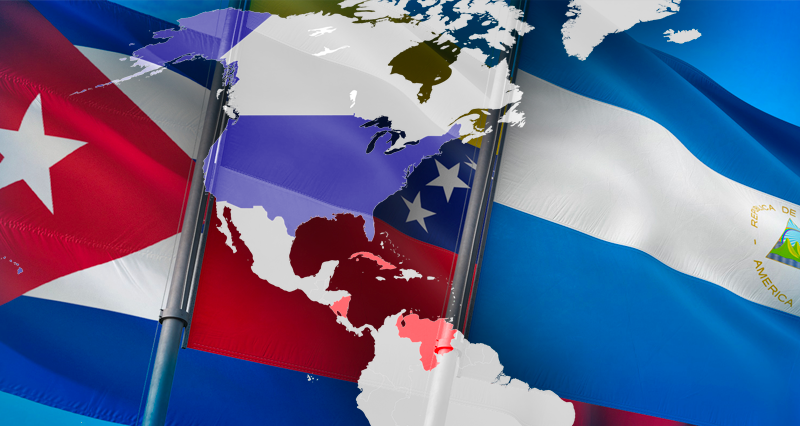The US government is making progress on its own territory, but no one less is impressed by that. There is something really ridiculous going on in the US foreign policy – something that reflects a huge decline.
There is the event called Summit of the Americas. This is a meeting of the Presidents and leaders of American continents, the north and south. It has started in 1994, after the Cold War, during the high-times of American domination.
Gathered in the framework of the Organization of American States (OAS), the summit was the space where the US generalized its interests over the continent. Besides heads of governments, business people, civil society representatives and so-called marginalized groups participated in the summits till today.
Over the years, the summit – as well as the OAS as the central organizing institution – has lost some importance. In 2018, when the gathering took place in Peru, than US President Donald Trump did not attend.
But this time, it is different: Biden says “the US is back”, referring to re-establishing US leadership. And the US President will take part on the 9th summit that is due to take place in Los Angeles beginning of June.
As it seems, he will be increasingly left alone.
The list of conflicts between the US and its southern neighbors is along, but currently, the conflict has a very principled nature: to decide who is part of the American international system.
As for the US position: The State Department’s top diplomat for the Western Hemisphere said he doesn’t expect to see representatives from Cuba, Venezuela and Nicaragua at June’s Summit of the Americas in Los Angeles.
Western Hemisphere Assistant Secretary of State Brian Nichols said “Cuba, Nicaragua, the [Nicolás] Maduro regime [in Venezuela] do not respect the Inter-American Democratic Charter, and therefore I don’t expect their presence”.
As the United States has rejected to acknowledge recent elections results in Nicaragua and Venezuela, and as it has the well-known policy on Cuba, the administration’s position to exclude these three countries is not surprising.
Moreover, if one considers that their absolute rejection of submission is the true reason of conflict.
What has been surprising, though, was the reaction from all over the continent.
The three countries reacted as expected, criticizing the US decision. Than followed Mexican President Lopez Obrador, who over and over attacked the US policy in press conferences in very harsh tones.
Mexico: “old interventionist policy”
Lopez Obrador repeated his earlier proposal to found a community similar to the European Union on the continent, and at the same time, called the exclusion of the three countries “a two-hundred years-old interventionist policy”.
Later on, Lopez Obrador, who visited Cuba officially, announced he would not take part at the summit if the three countries were no invited.
“If they’re excluded, if not all are invited, a representative from the Mexican government would go, but I wouldn’t,” Lopez Obrador said during his regular news conference on Tuesday.
He himself a leftist, Lopez Obrador was joined by Brazil’s president Jair Bolsonaro, who, according to Reuters, already informed his staff he would not attend neither.
Mexico and Brazil together make roughly half of the population of Latin America. But even more leaders joined them.
On behalf of CARICOM, the Community of 13 Caribbean States, Ronald Sanders, ambassador of Antigua in the United States, also stated they were considering to abstain from the summit. Sanders also criticized reflections within the US government to invite Juan Guaido, whom Washington recognizes as President of Venezuela.
Bolivian President joins Mexican position
“A Summit of the Americas that excludes American countries will not be a full Summit of the Americas and, if the exclusion of sister countries persists, I will not participate,” wrote Bolivian President Luis Arce wrote on twitter.
Protests also came from the Honduran President Castro, who said “if it’s not all of us, it is not the Summit of the Americas”.
Meanwhile, the White House press secretary, Jen Psaki, said Tuesday that “a final decision has not been made yet” on who will be invited.
The White House is responsible for the summit, not the State Department.
The discussion on who determines which country belongs to the American continent is continuing. While the Latin Americans pressure for the participation of all the members in their “state family”, the US might consider to invite some in the last minute, while keeping others excluded.
What ever the outcome: Latin American countries’ leaders are gaining self-confidence vis-à-vis the hegemon every day.
Foreign Policy author Christopher Sabatini already says “Biden Is Setting Himself Up for Embarrassment in Los Angeles” and fears the summit “could be the gravestone on U.S. influence in the region”.
But the other way around is maybe simply too hard to digest for the Washington establishment: Nicolas Maduro, Daniel Ortega and Miguel Díaz-Canel Bermúdez side by side in Los Angeles.

















Leave a Reply